Tinnitus, and COVID-19
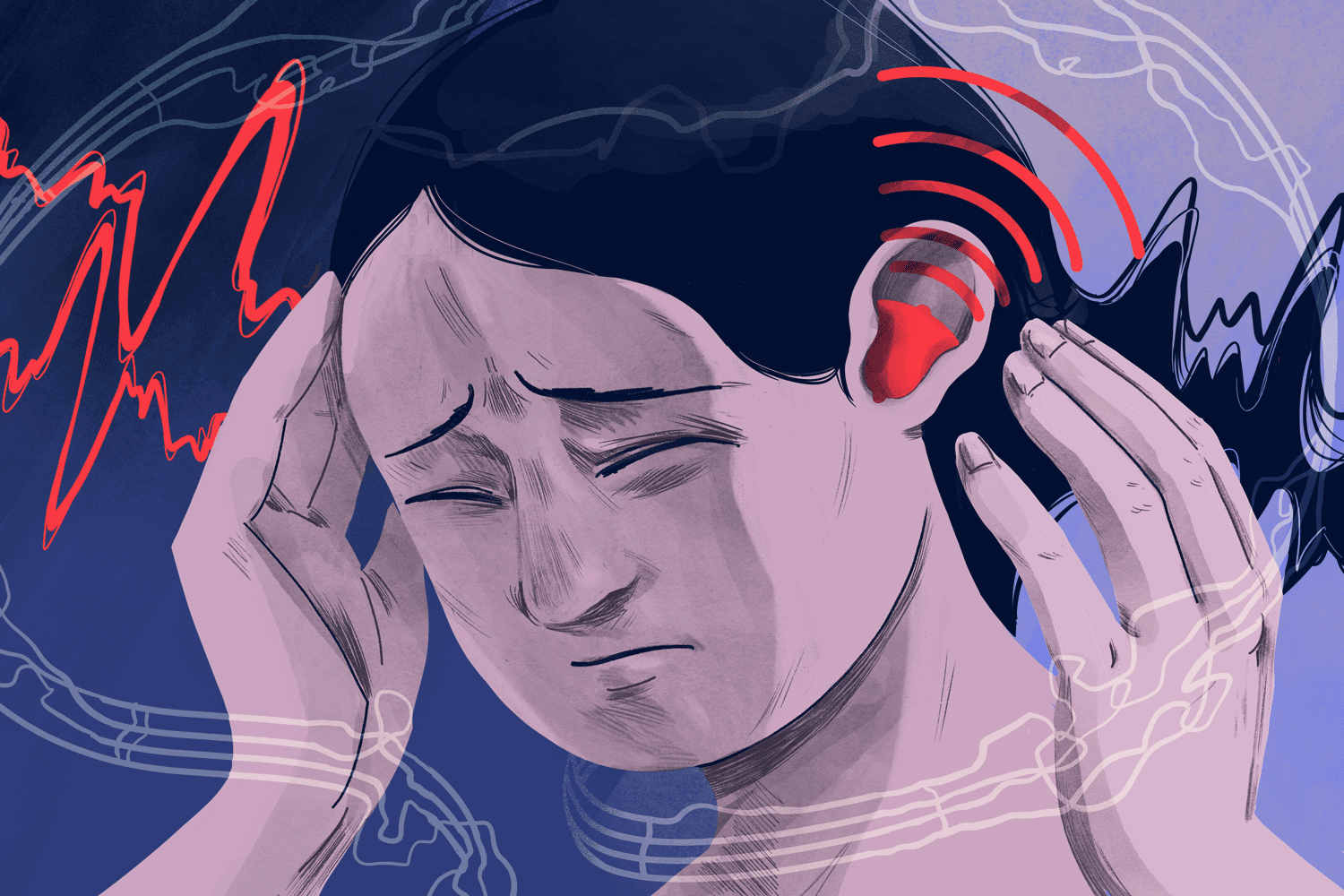
Effect of COVID and Vaccination: Tinnitus
COVD-19 and its vaccination lead to numerous cases of hearing-related issues popping up. Ringing in the ear or tinnitus is one of those conditions. Imagine you constantly hear a ringing sound in one ear, both ears, sometimes even in your head. The ringing sound might last for a few seconds or go on for minutes and hours. You wish it would stop, yet it will not. It's irritating to the point that it hinders each aspect of your life.
Sometimes, COVID causes the existing tinnitus problem to worsen or possibly get triggered in some people. Additionally, people with tinnitus struggle due to lifestyle changes forced by the pandemic. Tinnitus includes the perception of noise, like ringing, in the ears and head. It leads to reduced emotional well-being, depression, and anxiety. Ringing in the ears or tinnitus has been reported as an aftereffect of the coronavirus vaccination.
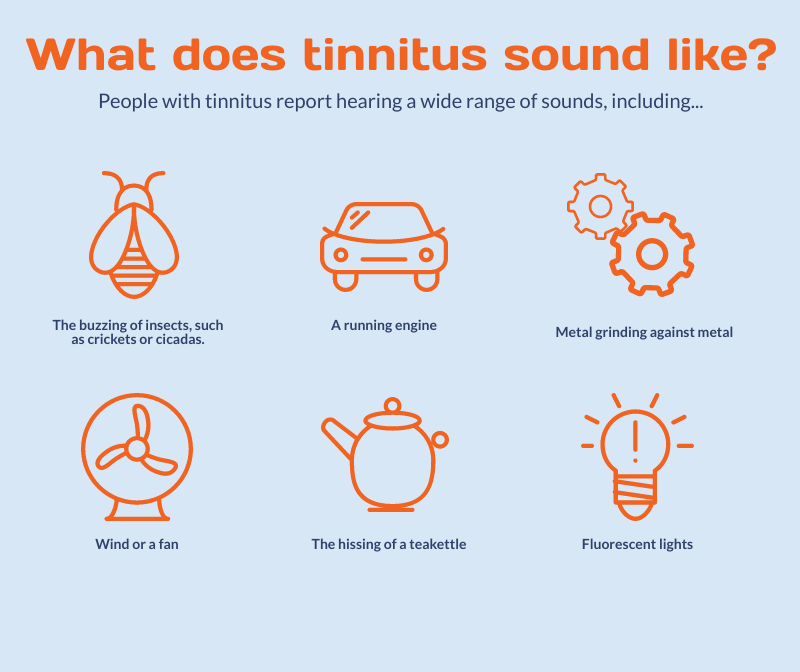
What is Tinnitus?
Tinnitus is usually described as a ringing in the ears, humming, or various sounds. This disagreeable sensation is normal: About 45 million Americans are impacted by tinnitus eventually in their life, per the American Tinnitus Association.
Tinnitus is something other than ear ringing. It very well might be in one ear, the two ears, or substituting from one side to another. The noise you hear may come in various structures, including ringing, scratching, throbbing, hearing your pulse, tolls, crickets, clicking, static, murmuring, or whooshing.
What Leads to Tinnitus?
Numerous reasons can cause tinnitus. Some of these reasons include:
- Hearing loss: Tiny, delicate hair cells are present in the inner ear or cochlea. This move when they receive sound waves triggering electrical signals along the nerve from your ear to your brain (auditory nerve). Your brain interprets these signals as sound. When the hairs in your inner ear are bent or broken, due to age or exposure to loud sounds, can produce random electrical impulses to your brain, causing tinnitus.
- Ear infection or ear canal blockage: The ear canals can be blocked due to fluid buildup (ear infection), earwax, dirt, or foreign materials. This blockage might change the pressure intensity in your ear, causing tinnitus.
- Head or neck injuries: Sometimes, head or neck trauma can damage the inner ear, hearing nerves, or brain function linked to hearing. Such injuries usually cause tinnitus in only one ear.
- Medications: Few medications may trigger or worsen existing tinnitus. Usually, the ringing of the ear disappears when you stop using these drugs. Some of the common medications that cause tinnitus are nonsteroidal anti-inflammatory drugs (NSAIDs) and some antibiotics, water pills (diuretics), cancer drugs, antidepressants, and antimalarial drugs. COVID-19 medicines and vaccination is also known to cause tinnitus.
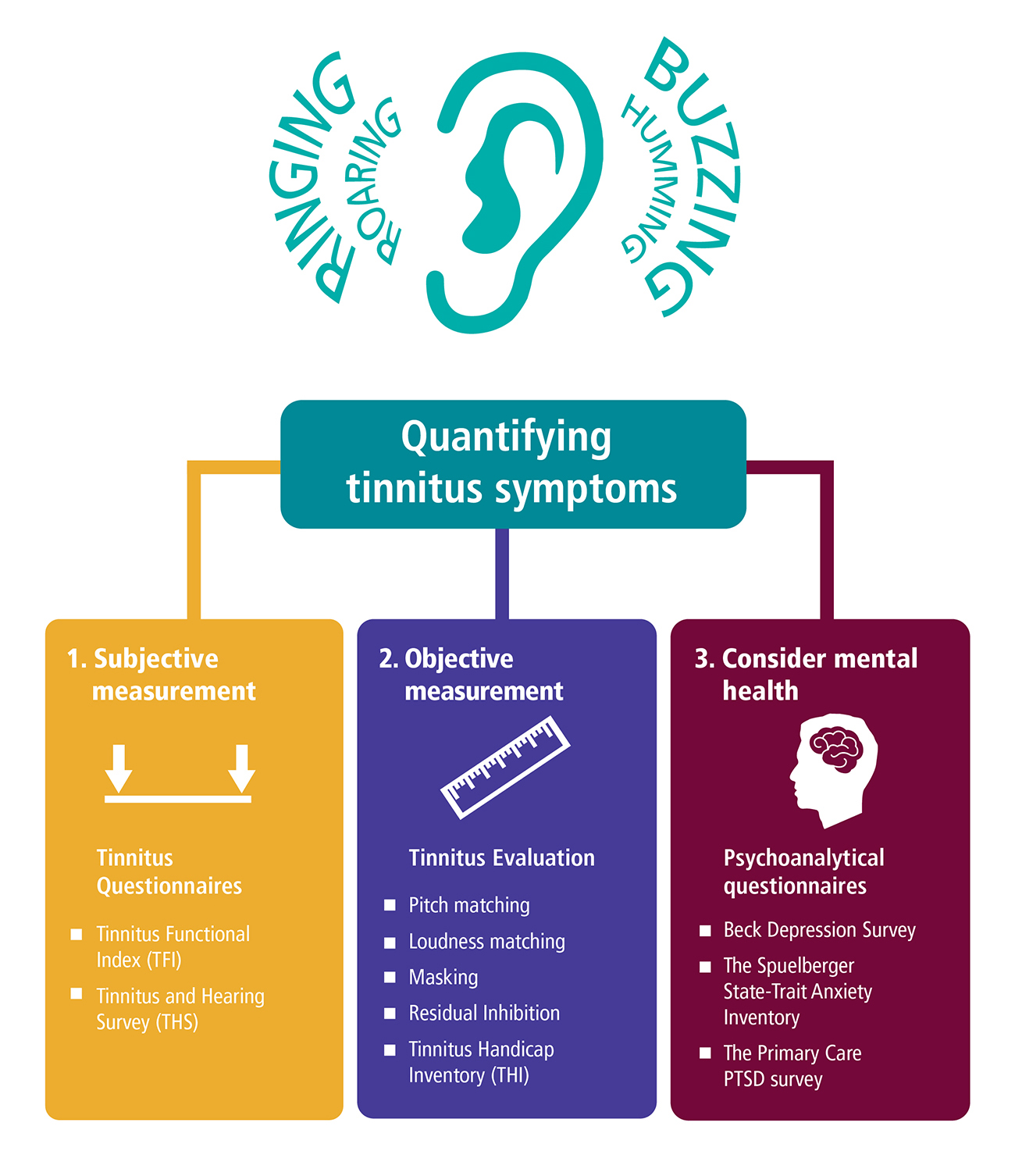
Other causes of tinnitus
Some of the less common reasons for tinnitus include other ear issues, ongoing ailments, and wounds or conditions that influence the nerves in your ear or the consultation place in your mind.
- Meniere's disease
- Eustachian tube dysfunction
- Ear bone changes
- Muscle spasms in the inner ear
- Temporomandibular joint (TMJ) disorders
- Acoustic neuroma or other head and neck tumors
- Blood vessel disorders
Other chronic conditions such as diabetes, thyroid problems, migraines, anemia, and autoimmune disorders including rheumatoid arthritis and lupus have also been linked with tinnitus.
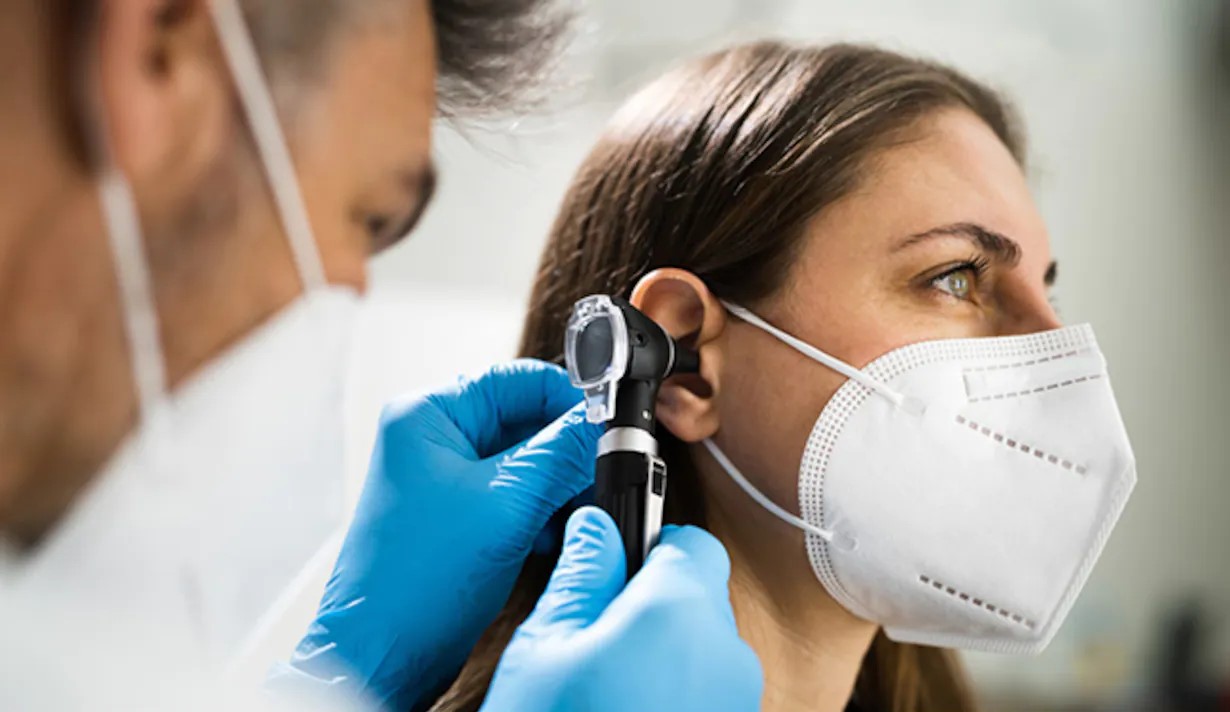
Risk factors
Anyone can experience tinnitus, but these factors may increase your risk:
Loud noise exposure: Loud noises, usually from heavy equipment, chain saws, and firearms, cause noise-related hearing loss. Portable music devices, like MP3 players, may cause tinnitus when played loudly for long periods. People working in noisy environments like factory and construction workers, musicians, and soldiers — are mainly at risk.
- Age: Various functioning nerve fibers in your ears decline, causing tinnitus.
- Sex: Men are prone to experience tinnitus.
- Use of alcohol and tobacco: Smokers have a higher risk of developing tinnitus. Alcohol additionally builds the risk of tinnitus.
- Certain health problems: COVID-19, obesity, cardiovascular problems, high blood pressure, and a history of arthritis or head injury all increase your risk of tinnitus.
- Buzzing
- Roaring
- Clicking
- Hissing
- Humming
- Fatigue
- Stress
- Sleep problems
- Trouble concentrating
- Memory problems
- Depression
- Anxiety and irritability
- Headaches
- Problems with work and family life
- Injection site pain
- Fever
- Aches and pains
- Hearing loss
- Dizziness
- Rotatory vertigo
- Reducing stress levels: Reducing your feelings of anxiety can help you with adapting to tinnitus and keep it from turning out to be more terrible. Some ways to reduce stress include:
- Yoga
- Meditation
- Deep breathing exercises
- Masking the noise: It could be useful to attempt to veil the noise by utilizing an alternate, more wonderful sound. An example would be to buy a convenient sound generator or download a background noise onto your telephone.
- Developing a sleep routine: Tinnitus can frequently influence rest. Along these lines, it's vital to foster a sleep schedule that advances great rest.
- Avoiding loud noises: Being in an exceptionally boisterous climate can aggravate tinnitus. In that capacity, intend to try not to be around clearly noises. On the off chance that you're going into a loud climate, make certain to utilize hearing assurance.
- Trying an alternative treatment: While more research is required, certain individuals might find that needle therapy or enhancements assist with tinnitus. Notwithstanding, a few enhancements might collaborate with prescriptions, so consistently check with your primary care physician before utilizing them.
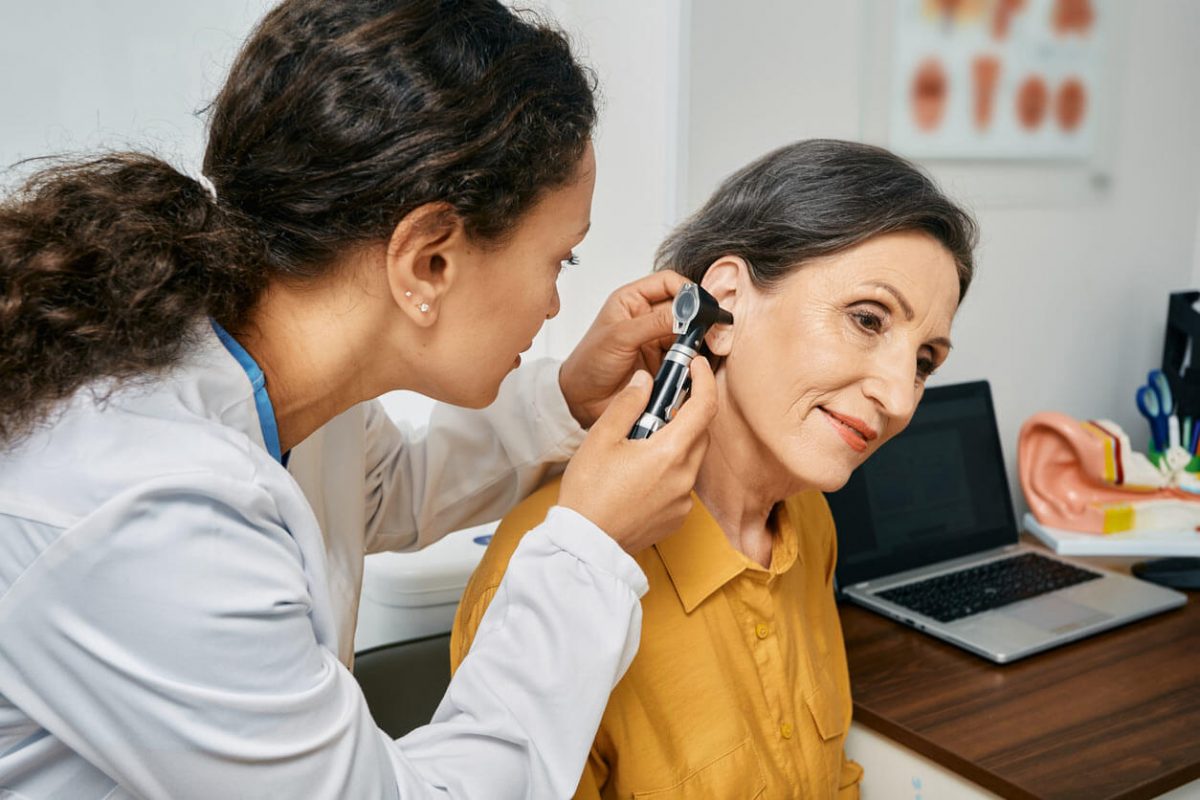
What are the Signs and Symptoms of Tinnitus?
Tinnitus is most frequently portrayed as a ringing in the ears, even though no external sound is available. Be that as it may, tinnitus can likewise cause different kinds of phantom noises in your ears, including:
Tinnitus influences people in an unexpected way. For certain individuals, tinnitus can essentially influence personal satisfaction. When you have tinnitus, you may likewise experience:
The connection between tinnitus and COVID-19 & Vaccination?
The reason why COVID-19 might prompt tinnitus is as yet unclear. Tinnitus during COVID-19 is for the most part accepted to be brought about by harm or inflammation in the internal ear, which might occur because of viral disease or because of your body's invulnerable reaction. The COVID-19 vaccine that is approved for crisis use is both protected and compelling at forestalling significant ailments because of COVID-19.
Some of the common side effects of the COVID-19 vaccines include:
Along with tinnitus, COVID-19 has likewise been related to a few different side effects that influence the hear-able or vestibular framework. These include:
What should you do if you experience tinnitus?
You can try some of the below things, whether or not your tinnitus is due to COVID-19:
Outlook
People with preexisting tinnitus have additionally experienced deteriorating tinnitus during the pandemic. This can be because of contracting COVID-19 or the general anxieties related to the actual pandemic. Tinnitus can likewise occur after COVID-19 inoculation. But, this side effect is viewed as uncommon. The reason behind it is obscure, albeit fundamental medical issues, inoculation anxiety, or unexpected safe reactions might assume a part.
If you or anyone you know is suffering from the effects of Covid-19, our expert providers at Post Covid Centers will take care of your health and help you recover.
Call us on (469) 545-9983 to book a telehealth appointment for a home check-up.
People Also Read:
Post Covid Syndrome vs. Fatigue
While COVID-19 is a short-lived disease in most people, others experien...
Post Covid Syndrome vs. Skin Weakness Problems
A new study illustrates that some patients with COVID-19 disease have continuous skin-associated symptoms...
RELATED BLOGS
